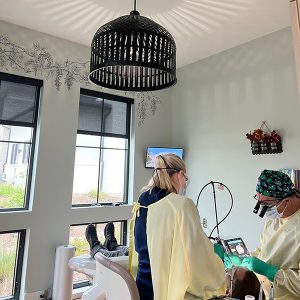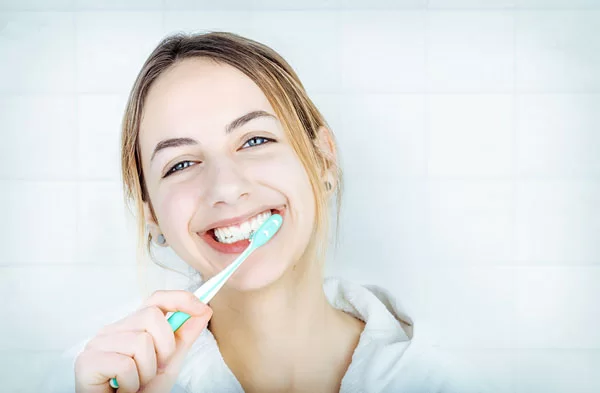Simple & Efficient Dental Cleanings for Optimal Oral Health
No one wants to face bothersome dental issues or feel embarrassed about their smile. By ensuring excellent oral hygiene and attending regular dental cleanings, you can avoid invasive procedures and confidently show off your smile.
Learn more about the dental cleaning process below to be well-prepared when you visit our Denton, TX, dentists for your upcoming appointment. Reach out to Garden Oaks Family & Cosmetic Dentistry at (940) 566-4888 today.
What is a Dental Cleaning?
A dental cleaning, also known as prophylaxis, is a professional teeth cleaning process where a dental hygienist removes plaque, tartar, and stains from teeth and gum lines. It’s an essential part of dental hygiene and oral health.
The Role of a Dental Hygienist
A dental hygienist is a trained professional who performs dental cleanings and other oral health procedures. They work under the supervision of a dentist and are responsible for maintaining the oral health of patients. Dental hygienists may also provide education and guidance on oral health and hygiene.
Benefits of Regular Dental Cleanings
Scheduling regular dental cleanings every six months provides many benefits, such as:
- Regular dental cleanings help prevent gum disease, tooth decay, and other oral health issues.
- They remove plaque and tartar, which can cause bad breath, bleeding gums, and other problems.
- Dental cleanings can also help prevent heart disease, diabetes, and other systemic diseases.
- They can improve the appearance of teeth and boost confidence.
How a Dental Cleaning Works at Our Denton, TX, Dental Office
1. Dental Exam
Before starting your dental cleaning, a dental hygienist or dentist will conduct a dental exam to identify any signs of issues like cavities or gum disease. These exams are crucial for assessing your oral health and determining if additional treatments are necessary. They’re typically quick and shouldn’t cause any discomfort.
At least once a year, our dental team will also perform digital X-rays to uncover problems that aren’t visible to the naked eye.
2. Plaque and Tartar Removal
Our dental team utilizes specialized dental instruments, such as a dental scaler, to effectively perform plaque and tartar removal. The hygienist may also use an ultrasonic device to remove stubborn plaque and tartar. Plaque is a sticky bacterial film that accumulates on teeth, potentially leading to cavities and gum disease. Tartar is a hardened mineral deposit that forms when plaque isn’t adequately removed and can only be eliminated by a dentist or dental hygienist.
You might experience some sensitivity during this process, but it shouldn’t be painful. If you have sensitive teeth or gums, your dentist may apply a local anesthetic before the cleaning.
3. Teeth Cleaning and Polishing
After the removal of plaque and tartar, our dentist will proceed to clean and polish your teeth using a specially formulated toothpaste and brush. This step helps in eliminating surface stains, leaving your teeth feeling smooth, shiny, and thoroughly clean.
4. Flossing
Our dental hygienists will then proceed to floss between your teeth to eliminate any lingering plaque or food debris. Flossing is a crucial element of dental cleaning as it reaches areas between teeth that a toothbrush can’t effectively clean.
5. Fluoride Treatment
Based on your oral health needs, Dr. Patrick Ruehle and Dr. Erika Eide might suggest a fluoride treatment to safeguard your teeth against decay. Fluoride is a mineral that aids in remineralizing teeth, enhancing their resistance to decay. The fluoride treatment can be administered as a gel, foam, or varnish applied to the teeth and allowed to remain for a few minutes.
Post-Dental Cleaning Care
Following a dental cleaning, you might experience some sensitivity, particularly if it involves a deep cleaning. To ensure optimal recovery and comfort, we suggest the following:
- Continue with your regular brushing and flossing routine.
- If you experience sensitivity, try to avoid foods and drinks that are extremely hot, cold, sweet, or acidic.
- Use a saltwater rinse or anti-sensitivity mouthwash to help ease any discomfort.
- Schedule regular dental check-ups and cleanings as recommended by our dentist, generally every six months.
Frequently Asked Questions
To maintain optimal oral health, it’s advised to schedule regular dental cleanings every six months. Individuals with a history of oral health concerns might require more frequent cleanings. Additionally, practicing good oral hygiene, including brushing and flossing, is crucial for healthy teeth and gums.
If you experience dental anxiety, it’s important to discuss your concerns with your dentist. They may offer sedation options like nitrous oxide or prescribe anti-anxiety medication to help you feel more at ease during the procedure.
To ensure the effectiveness of your fluoride treatment, it’s advisable to refrain from eating or drinking before your dental cleaning. Consuming food or beverages can diminish the treatment’s efficacy.
Enjoy a Relaxing Visit With Our Denton Dentists
Scheduling dental cleaning appointments is vital for maintaining excellent oral hygiene and preventing dental issues. To begin your journey with our Denton dentists, contact our dental office today by calling (940) 566-4888.
We’re gladly welcoming new patients at Garden Oaks Family & Cosmetic Dentistry and are excited to serve individuals in Denton and surrounding areas, including Robson Ranch, Corinth, Argyle, and Krum, TX.





